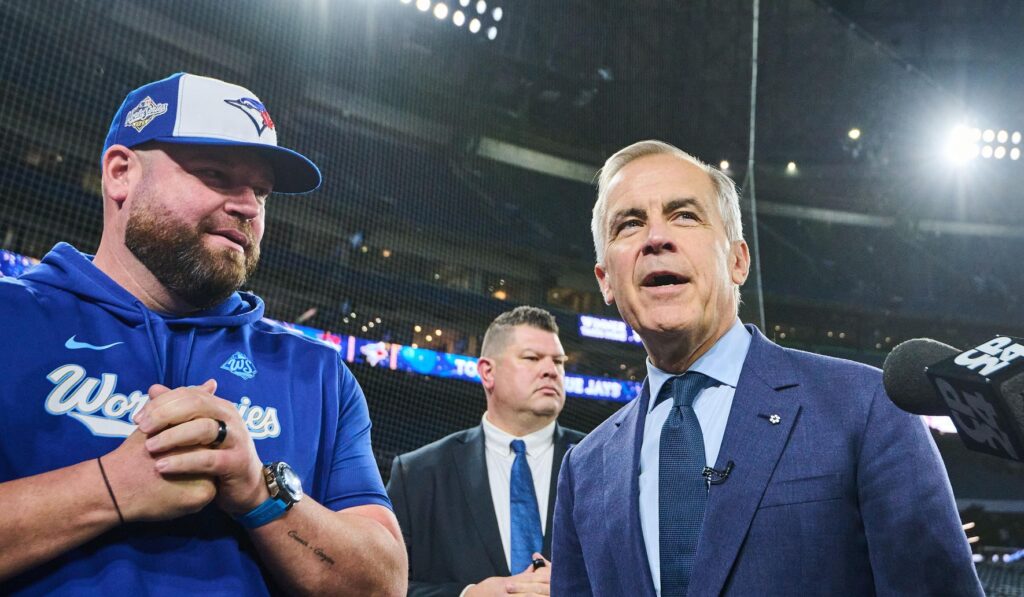Canadian Prime Minister Mark Carney publicly challenged U.S. President Donald Trump to a friendly wager on the World Series matchup between the Toronto Blue Jays and the Los Angeles Dodgers, turning a sports moment into a bit of cross-border banter. The exchange landed in public view and prompted reactions about mixing high-level politics with a pastime that people on both sides of the border care about. This piece looks at what that kind of wager signals, how conservatives might read it, and why presidents and public figures sometimes use sports to score soft diplomatic points. The focus stays on the Blue Jays, the Dodgers, and the political flair that surrounded the offer.
When a prominent figure tosses a challenge at the president, it is partly about the game and partly about headlines. For many Republicans, a wager like this is harmless theater—something that humanizes leaders without altering policy or principles. It gives voters an image of normal, relatable rivalry during a high-profile sporting event. At the same time, skeptics see it as a distraction from more important issues where real leadership matters.
A friendly bet on the World Series fits a long American tradition of leaders engaging with popular culture. Conservatives often appreciate when political figures show they enjoy the same pastimes as everyday Americans, like baseball and tailgate conversations. That kind of connection can defuse tension and show a lighter side of public life without compromising the serious business of governing. Still, the optics depend on how the president responds and whether the exchange stays in good humor.
Sports rivalries themselves carry deep regional pride, and a Toronto-Los Angeles matchup brings cross-border attention. Fans of the Blue Jays see a chance to cheer on their underdog pride while Dodgers supporters expect a polished, powerful club. For many observers, the betting challenge is a nudge to fans to turn out and make the stadium energy count, not a diplomatic maneuver. Conservatives will point out that real diplomacy happens off the field, in agreements and policies that affect citizens day to day.
There is also a practical side to public wagers between leaders: they are symbolic gestures that can open informal channels. Republicans prefer symbolic gestures that do not substitute for substance, but they often welcome the occasional light-hearted interaction. A wager can stretch a public conversation into something approachable and fun without risking national interests. The key is keeping symbolic moments separate from serious governance responsibilities.
History shows presidents have long used sports to their advantage, from relaxing moments catching a game to hosting championship teams at the White House. For conservatives, such moments are useful when they reinforce character and relatability without undermining the office. The challenge from a foreign leader adds a playful international twist that can be spun as friendly competition. It also gives media plenty to cover, which is useful to keep positive headlines rolling during busy news cycles.
At the end of the day, a wager on the World Series is mostly about fandom and image, not policy shifts. Conservatives tend to value clear lines between symbolic goodwill and concrete action, so they look for assurances that serious matters remain prioritized. Public figures who embrace casual rivalry and sportsmanship get credit for being approachable, but they also face scrutiny if those moments distract from governing. Either way, baseball remains a shared language that cuts across political divides.
The Toronto Blue Jays versus the Los Angeles Dodgers promises big moments on the field, and the political flavor around the game only adds to the buzz. Republicans will enjoy the spectacle when it underscores leadership that stays focused on the job while enjoying common culture. Fans can cheer, critics can scoff, and the teams will play ball regardless of who made the wager. The promise of strong, normal engagement with American pastimes remains appealing to voters who want leaders that know how to balance seriousness and everyday life.



